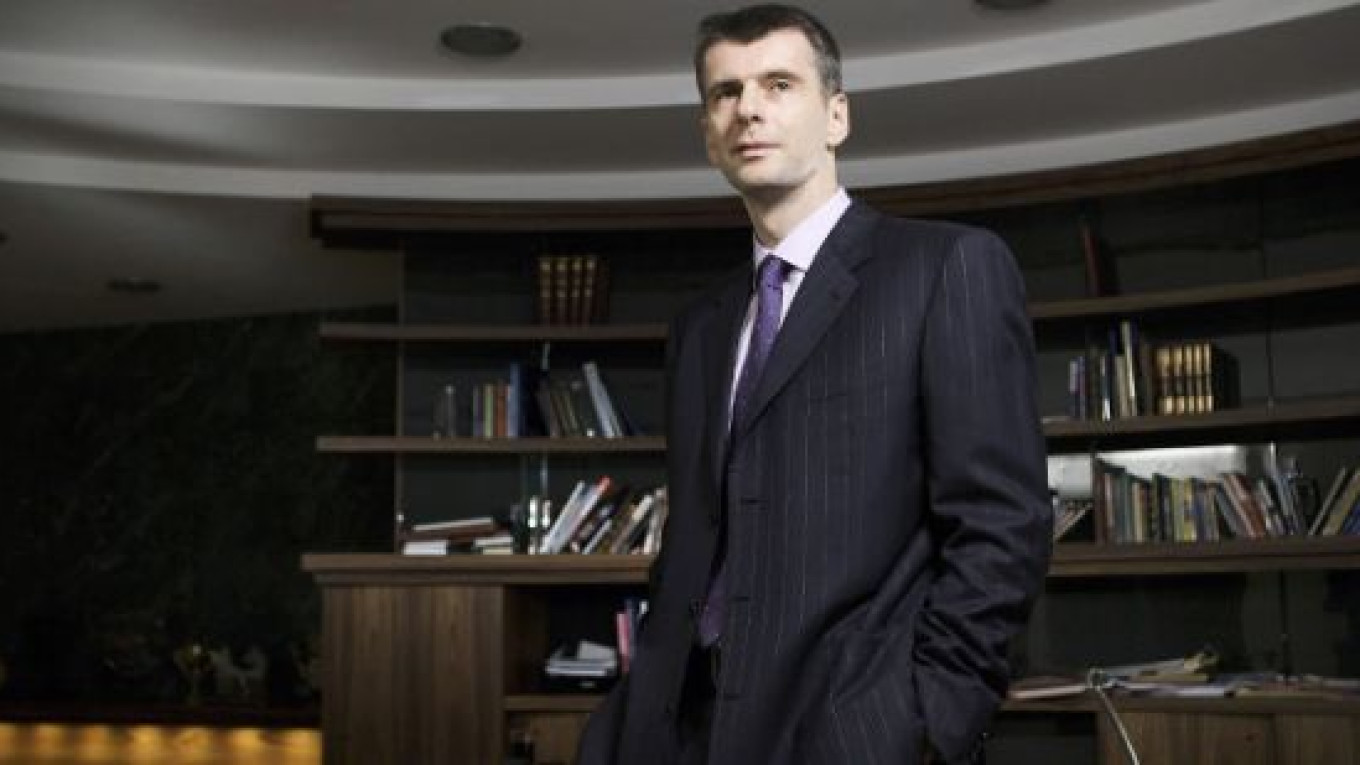Billionaire Mikhail Prokhorov has sold his stake in London-listed gold miner Polyus Gold to two Russian buyers for $3.6 billion after approval from British regulators.
The sale marks the end of an era for Prokhorov, an investor-turned-politician who ran for the Russian presidency last year and now leads a small liberal political party called Civil Platform.
He had originally harbored ambitions for an international M&A deal involving Polyus, which has now become the focus of speculation about a merger in Russia with Polymetal.
Prokhorov's Onexim group sold 18.5 percent of the Polyus stake to Russian retail tycoon Zelimkhan Mutsoyev for $1.77 billion and 19.28 percent to fruit juice magnate Gavriil Yushvayev for $1.85 billion. This was below the $3.8 billion market price as of Thursday's close.
"Polyus Gold has been one of the major assets of Onexim Group," Dmitry Razumov, head of Prokhorov's Onexim, said in a statement announcing the deal. "We made the decision that the time had come for Onexim Group to sell and realize its profit."
The deal had been under review by merger watchdog the U.K. Takeover Panel over whether Mutsoyev and Yushvayev were acting in concert.
If the pair had been found to form a "concert party" together, or in relation to existing shareholder Suleiman Kerimov, who owns 40 percent of Polyus, it would have triggered a mandatory buyout offer to minority shareholders. Sources had said Thursday that Takeover Panel approval for the deal was imminent.
Prokhorov still has some big commodity holdings including a 17 percent stake in Russia's aluminum giant RusAl and mining company Intergeo, which may launch either a private placement or an initial public offering of stock in Toronto this year.
The sale coincides with a falling gold price. Spot gold prices have fallen more than 5 percent since December.
The Polyus deal has attracted a lot of investor attention, due to speculation it could pave the way for a tie-up with Polymetal, a firm formerly owned by Kerimov, that would create a mining business worth $17 billion.
"A merger with Polymetal is possible. It will depend on how Polyus will develop," said Nikolai Sosnovsky, an analyst at VTB Capital.
A merged Polyus and Polymetal could have the resources to be the first in line to develop Russia's untapped reserves such as Siberia's Sukhoi Log, one of the world's largest virgin gold deposits, which is likely to be put up for tender soon.
Sosnovsky expects Polyus to change its strategy in the near future and also to increase dividend payments. "The company will no longer focus on tripling production and will pay more attention to investing responsibly," he said.
He expects Polyus's dividend yield to reach about 5 percent in coming years, up from a previous 1-2 percent and an average 1.5 percent seen in the global gold sector.
Polyus shares were up 1.9 percent by 10:07 Greenwich Mean Time on Friday at 223.25 pence. Polymetal shares in London were up 2.8 percent.
Sources close to the discussions said the Polyus deal terms were agreed in December, prior to a rise in Polyus' shares. Polyus' shares have risen about 7 percent since the end of December.
Retail magnate Mutsoyev is a 53-year-old lawmaker for the ruling United Russia party who started out as a dump truck driver before going into business in the 1980s and building a fortune estimated by Forbes magazine at $1.5 billion.
His family controls the Regions Group of shopping centers, and he joined Kerimov as a co-investor in the $24 billion merger that created potash producer Uralkali in 2011.
Yushvayev, 55, is a former co-owner of juice and dairy firm Wimm-Bill-Dann, now part of PepsiCo, whose net worth has been estimated at $1.2 billion.
Kerimov's Nafta Moskva, which holds 40 percent of Polyus, said Friday that it was not involved in the deal with Prokhorov's stake.
Related articles:
A Message from The Moscow Times:
Dear readers,
We are facing unprecedented challenges. Russia's Prosecutor General's Office has designated The Moscow Times as an "undesirable" organization, criminalizing our work and putting our staff at risk of prosecution. This follows our earlier unjust labeling as a "foreign agent."
These actions are direct attempts to silence independent journalism in Russia. The authorities claim our work "discredits the decisions of the Russian leadership." We see things differently: we strive to provide accurate, unbiased reporting on Russia.
We, the journalists of The Moscow Times, refuse to be silenced. But to continue our work, we need your help.
Your support, no matter how small, makes a world of difference. If you can, please support us monthly starting from just $2. It's quick to set up, and every contribution makes a significant impact.
By supporting The Moscow Times, you're defending open, independent journalism in the face of repression. Thank you for standing with us.
Remind me later.


